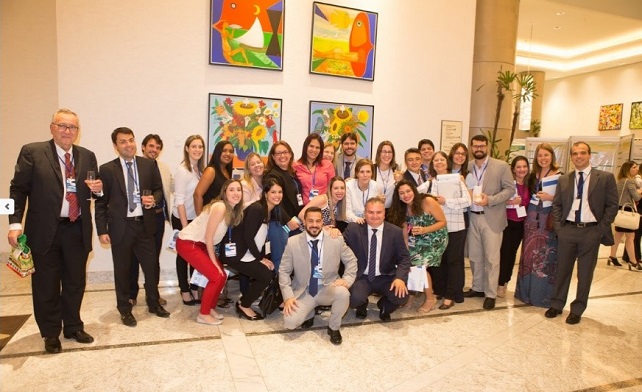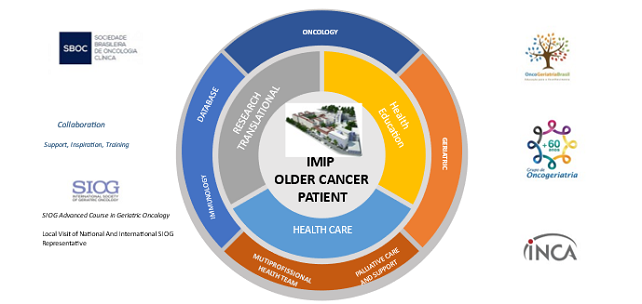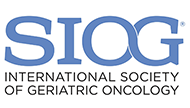April 15, 2021

Background
At present, older adults are the majority of the cancer population, including low and middle-income countries. They suffer in a disproportionate manner from inequity―even considering regional realities―and experience greater difficulty in accessing timely cancer care when compared to the younger population. A large part of this population has not access to cancer screening policies and/or early diagnosis. They are prescribed less cancer therapies and the advances they represent due to concerns about the ability of these individuals to tolerate or benefit from the treatments. Older adults are underrepresented in research conducted all over the world, and even more in developing countries like Brazil.
Cancer is the second leading cause of death among Brazilians; however, it will be the first by 2030, mainly due to the population ageing. Older adults already represent the majority of cancer patients and cancer deaths in Brazil. They correspond to the age group in which the greatest proportional growth will occur. According to the World Health Organisation (WHO), in 2025, Brazil will be the sixth country in the world in number of older adults.
Professor Fernando Figueira Institute of Comprehensive Medicine (IMIP)[1] is an academic hospital, located in the northeast region of Brazil. It features 1,156 beds for various specialties. This institution has a regional oncology centre established within its complex that serves the population through the Brazilian Public Health System (SUS), with dozens of medical and multiprofessional residency programmes, as well as master’s and doctoral programmes. This interdisciplinary combination, with a tradition in training human resources and research, was essential for the creation of the oncogeriatric service, considering the need for an innovative, interdisciplinary and comprehensive service, capable of training human resources and obtaining scientific evidence.
The proposal was to create a service capable of offering humane treatment, taking into consideration the age profile of the target group. The service should assess the overall health of the older adult population with cancer, who may experience a compromised quality of life if not treated properly. In order to obtain greater gain in quality of life and survival, the service would also have to consider the impact of other health conditions the target group may have, which would impact the cancer treatment.
To fulfil this task, the units of clinical oncology, geriatrics, palliative care, immunology, and translational research of the IMIP collaborated and started offering healthcare that was not limited to medical consultations. In addition to considering clinical and biological issues, with the interdisciplinary team integrated, these units started offering interdisciplinary healthcare taking into consideration social, psychological, functional, and cultural contexts in which this older adult population is inserted. The objective was to meet the needs with a sense of responsibility, and contribute to the improvement of personalised healthcare provided to this population.
“Step forward and we are no longer in the same place”. A Walk in the Free World
Chico Science & Nação Zumbi
Opportunities and challenges
Organising health systems to efficiently address the need for healthcare related to ageing and cancer in low-and middle-income countries is particularly challenging, due to the accelerated growth of these closely related problems. In addition, fragmented healthcare models, limited scientific evidence, and scarce resources represent a situation of inequity.
In 2015, an inter-institutional doctoral project in oncology, designed together with the National Cancer Institute (INCA), Brazil, was started which involved the assessment of a prospective cohort of older adult cancer patients, starting with their comprehensive evaluation, collection of clinical and laboratory data, and monthly follow-up for outcomes of serious adverse events (death, infection, and hospitalisation). So far, 2,660 older adult cancer patients have been enrolled, and their serological samples collected, in a biorepository/biobank to study their immune profiles.
The first results of our work highlighted the global health needs of our older adult population with cancer and the various challenges. These results were also presented to the Municipal Council for the Older Adults in Recife, and the project titled “Qualification of Oncological Care for Older Adults at IMIP” was approved, thus allowing the fundraising of around 500,000 USD (US dollars), through contributions to the Older Adult Fund, for the reform and consolidation of a multidisciplinary space for oncogeriatric care, education, and research activities. It was opened in 2020, and new fruits are being harvested.
The service continues to grow, having performed approximately thirty-two thousand interdisciplinary consultations, integrated with teaching and research activities. Today it is a regular practice field for interdisciplinary healthcare, oncology residency training programmes, palliative care, geriatrics, radiotherapy, haematology, oncological surgery, and multiprofessional residency in older adult health and palliative care (physical education, nursing, pharmacy, physiotherapy, speech therapy, nutrition, dentistry, psychology, social work, and occupational therapy), in addition to a computer scientist integrated into the research centre and the laboratory for translational studies.
In addition to the relationship with the various research groups at IMIP, a new cancer, ageing, and palliative care research group was consolidated. It is composed of twelve doctoral projects and fourteen master’s projects from IMIP graduate programmes and from several national academic institutions, forty-two scientific initiation projects, and a post-doctoral project. The group produces international and national publications, oral presentations, and scientific and national events.
A recent visit by Professor Lodovico Balducci (Figure 1), a member of the International Society of Geriatric Oncology (SIOG), also contributed immensely to the strengthening of the oncogeriatric group at IMIP.Professor Balducci returned to attend scientific events held by the Brazilian Society of Clinical Oncology (SBOC) in 2016 and 2018, accompanied by the Brazilian representative of SIOG, Dr. Theodora Karnakis, consolidating the topic and the opportunities in regional oncology.

Figure 1. Professor Ludovico Balducci and IMIP oncogeriatric team, 2016.

Figure 2. IMIP Oncogeriatric Service collaborative model
References
- Lima, J. T. de O. (2017). Sobrevida e fatores de risco para o desenvolvimento de eventos adversos precoces em pacientes oncológicos idosos / Survival and prognostic factors for the development of adverse events in old oncological patients. Rio de Janeiro: INCA (207 f. il). graf. Thesis in Portuguese | LILACS, Inca | ID: biblio-943719 Biblioteca responsável: BR440.1 Localização: BR440.1 https://pesquisa.bvsalud.org/portal/resource/pt/biblio-943719
- Soto-Perez-de-Celis, E., de Glas, N. A., Hsu, T., Kanesvaran, R., Steer, C., Navarrete-Reyes, A. P., Hurria, A. (2017). Global geriatric oncology: Achievements and challenges. J Geriatr Oncol. 2017 Sep;8(5):374-386. doi: 10.1016/j.jgo.2017.06.001. Epub 2017 Jun 20.
- Camara, D. B., Lima, J. T. de O., Bezerra, M. R., Sales, D. F., Cavalcanti, Z. R., Sales, L. T., … De Mello, M. J. G. (2020). Prognostic performance of the modified-G8 screening instrument for patients aged 60 years or older: A prospective cohort of 889 Brazilian patients. J Geriatr Oncol. 2020 Apr; 11(3):533-535. doi: 10.1016/j.jgo.2019.10.021.
- Sena, G. R., Lima, T. P. F., Mello, M. J. G., Thuler, L. C. S., Lima, J. T. de O. (2019). Developing Machine Learning Algorithms for the Prediction of Early Death in Elderly Cancer Patients: Usability Study. JMIR Cancer, v. 5, p. e12163.
- Lima, P. M. A., Torres, L. C., Martins, M. R., Da Matta, M. C., Lima, J. T. de O., De Mello, M. J. G., Forones, N. M. (2019). Soluble levels of sCD40L and s4-1BB are associated with a poor prognosis in elderly patients with colorectal cancer. Journal of Surgical Oncology, v. 120, pp. 1508.



Leave A Comment
You must be logged in to post a comment.